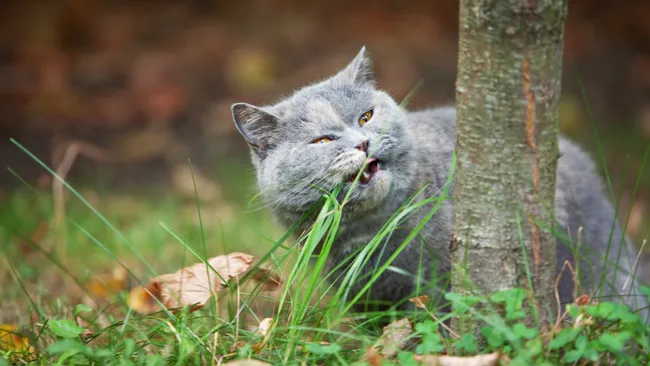There are many theories for why cats and dogs eat grass, and some could be “old wives’ tales.”
If you’ve ever noticed your dog or cat eating grass, you might have wondered why they do it — especially since cats are carnivores. While it may seem strange, veterinarians say this behavior is common and usually harmless.
According to Dr. Jamie Lovejoy, a veterinarian at Stack Veterinary Hospital in Syracuse, New York, grass-eating behavior in pets has many possible explanations. Unlike herbivores, dogs and cats don’t have the digestive systems to break down tough plant cellulose. Herbivores typically have special gut bacteria, multi-chambered stomachs, and long digestive tracts, but our pets do not.
Myth: Pets Eat Grass to Settle an Upset Stomach
One popular theory is that grass helps dogs or cats vomit when they feel sick. However, studies suggest illness explains only a small percentage of grass-eating episodes. A 2008 survey found that while 68% of dogs ate plants daily or weekly, only 8% showed signs of illness beforehand.
Similarly, two 2021 surveys of cat owners revealed that just 6–9% of cats seemed sick before eating grass, although many vomited afterward. The research also showed no difference in grass-eating frequency between long-haired and short-haired cats, challenging the idea that it’s mainly for hairball removal.
A Natural Instinct
Grass-eating is also seen in wild canines and felines, suggesting it’s an instinctive behavior. Some scientists believe wild animals use grass to help remove intestinal parasites. While most modern pets in the U.S. don’t have high parasite loads, this instinct may still linger.
Possible Nutritional Reasons
Grass has little to no nutritional value, but some experts speculate pets may seek micronutrients like B vitamins. However, for healthy pets on balanced diets, this is unlikely unless there’s an underlying deficiency.
When to Worry
“If you have a healthy pet that occasionally eats grass, there’s usually nothing to worry about,” says Dr. Lori Teller of Texas A&M University. But if your pet is constantly eating grass or vomits every time, it’s worth checking for health issues.
Safety Precautions for Pet Owners
While grass itself is generally safe, some plants are toxic to pets, according to the ASPCA. Also, grass treated with pesticides or fertilizers can be dangerous. Always monitor what your pet is nibbling on outdoors.
Bottom Line
Veterinarians agree there is no single reason why pets eat grass — they may like the taste, want sensory stimulation, or simply be exploring. For most healthy cats and dogs, it’s a harmless quirk. But persistent or excessive grass-eating paired with vomiting should be checked by a vet.
